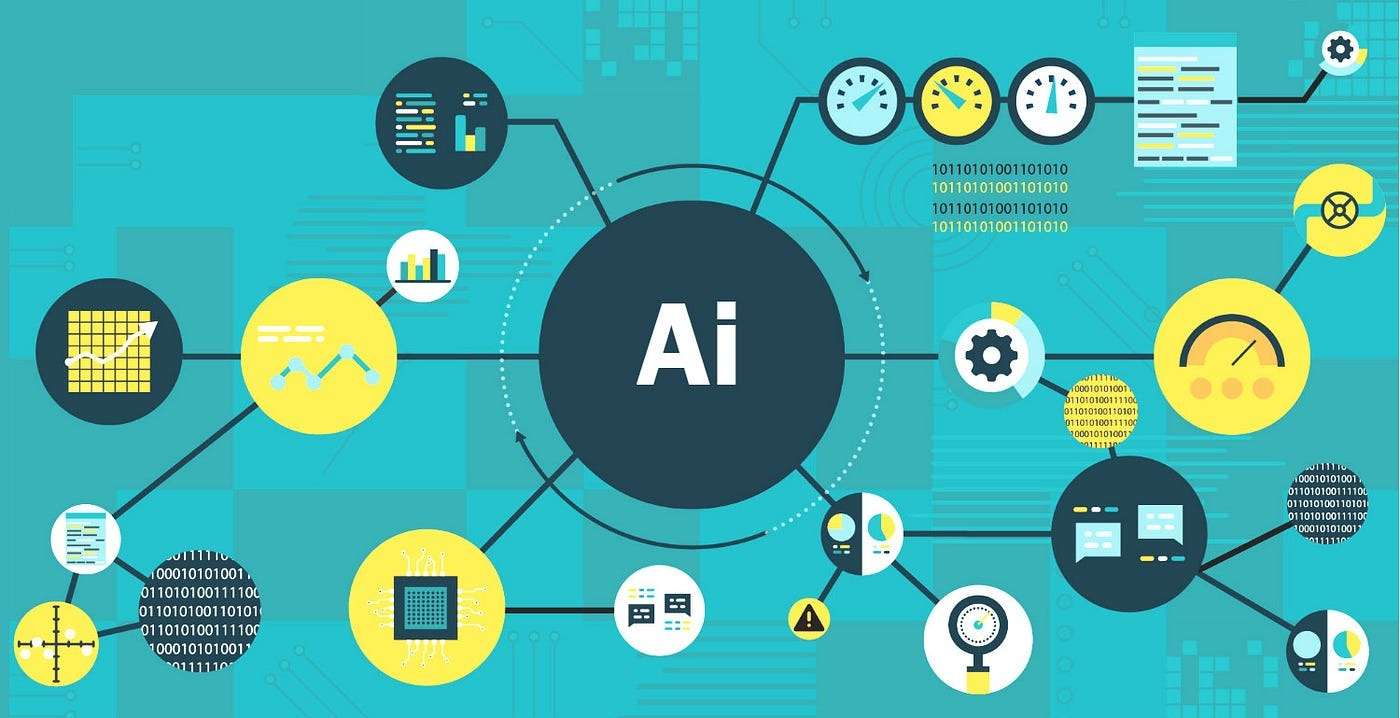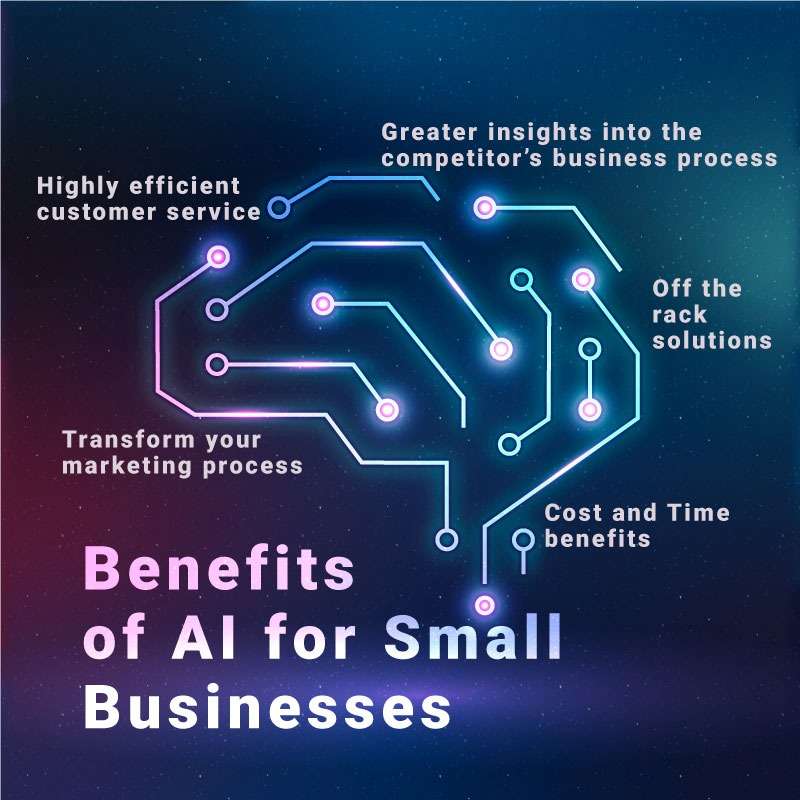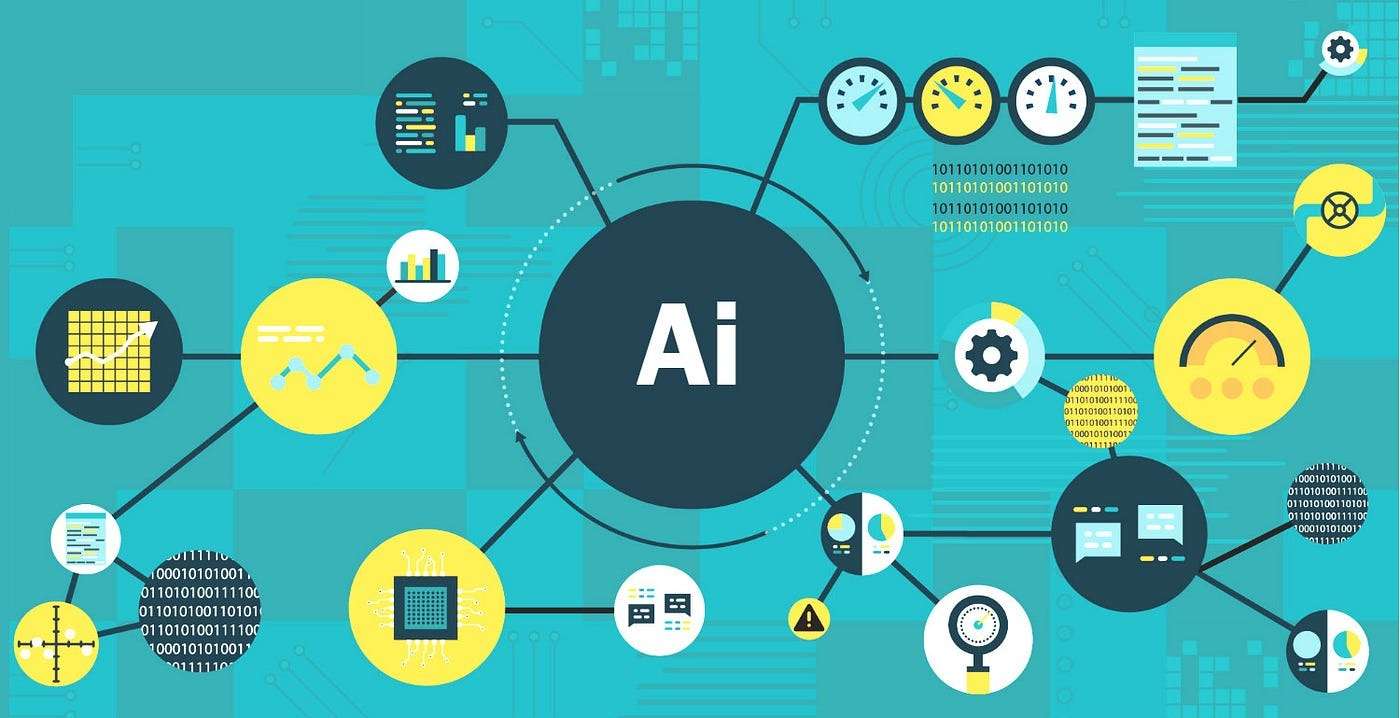Benefits of artificial intelligence in business

May 16, 2024
Benefits of artificial intelligence in business
"Discover how incorporating artificial intelligence into your business can streamline processes, improve decision-making, and increase efficiency. Learn about AI technology's various applications and advantages in this all-inclusive guide."
"Artificial intelligence, once a concept reserved for science fiction, has now become a powerful tool for businesses of all sizes. From streamlining processes to improving decision-making, AI has the potential to revolutionize the way we do business. In this blog post, we'll explore the numerous benefits of incorporating artificial intelligence into your business strategy and how it can give you a competitive edge in today's rapidly evolving market."
In today's technology-driven world, artificial intelligence (AI) is playing a crucial role in the success of businesses. AI refers to the development of computer systems that can perform tasks that typically require human intelligence, such as problem-solving, decision-making, and speech recognition. The use of AI in business has numerous benefits, making it an essential tool for companies looking to stay competitive in the market.

One of the most significant benefits of AI in business is its ability to automate mundane and repetitive tasks. This frees up time for employees to focus on more productive and creative tasks, leading to increased efficiency and productivity. For example, AI-powered chatbots can handle customer queries and complaints, reducing the workload of customer service representatives. This saves time and resources and improves the overall customer experience.
Another benefit of AI in business is its ability to analyze vast amounts of data quickly and accurately. With the growing volume of data generated by businesses, it has become nearly impossible for humans to process and analyze it effectively. AI algorithms can sift through this data, identify patterns, and provide valuable insights that can help businesses make informed decisions. This allows companies to streamline their operations, identify new opportunities, and improve their products or services.
Moreover, AI can also assist businesses in predicting future trends and patterns based on past data and behavior. This can be useful in various areas, such as sales forecasting, inventory management, and market analysis. By understanding future trends, businesses can make informed decisions to stay ahead of the competition and meet customer demands effectively.
AI can also help businesses personalize their marketing strategies by analyzing customer data, behavior, and preferences. This allows companies to deliver personalized and targeted marketing campaigns, leading to higher conversion rates. Additionally, AI can also assist in identifying potential leads and customers, thus improving businesses' overall marketing and sales efforts.
One of the most exciting uses of AI in business is in the field of customer service. AI-powered chatbots can handle customer inquiries and complaints 24/7, providing quick and efficient responses. This not only improves customer satisfaction but also reduces the burden on human customer service representatives. Furthermore, AI can also analyze customer feedback and sentiment, allowing businesses to understand their customers better and make necessary improvements.
Another significant benefit of AI in business is its potential to reduce costs. By automating tasks and processes, companies can save on labor costs and improve overall efficiency. AI can also identify areas of waste and inefficiency, allowing businesses to make necessary improvements and cost-cutting measures.
Furthermore, AI can also assist in improving the accuracy and quality of work in various industries. In the healthcare sector, AI-powered diagnostic tools can analyze medical images and assist doctors in detecting diseases more accurately. Similarly, in the financial sector, AI algorithms can detect fraud and reduce the risk of financial losses.
In conclusion, the benefits of AI in business are vast and diverse, making it an essential tool for companies of all sizes and industries. From automating mundane tasks to predicting future trends and improving customer service, AI can provide a competitive advantage to businesses. Embracing AI technology can help organizations boost efficiency, reduce costs, and stay ahead of the rapidly evolving business landscape. Therefore, businesses should consider incorporating AI into their operations to reap its numerous benefits and stay ahead of the game.
Role of artificial intelligence in business
Artificial intelligence (AI) is rapidly transforming the world we live in, and its impact can be seen in various industries. One sector that is greatly benefiting from AI technology is business. From streamlining operations to improving decision-making, the role of AI in business is becoming increasingly crucial.
One of the key roles of AI in business is automation. With the advancement of AI, machines are now able to perform tasks that were once thought to be exclusively done by humans. This has led to increased efficiency and productivity as mundane and repetitive tasks can now be handled by AI-powered systems. This allows employees to focus on more high-value tasks, resulting in a more productive workforce.
In addition to automation, AI is also playing a vital role in data analysis. Today’s businesses are generating huge amounts of data, and it can be a daunting task for humans to make sense of it all. AI can analyze vast amounts of data in a fraction of the time it would take a human, and it can identify patterns and trends that humans may miss. This allows businesses to gain valuable insights into their operations, customer behavior, and market trends, which can help them make informed decisions.
Another aspect where AI is making a significant impact is customer service. With the rise of chatbots and virtual assistants, businesses are now able to provide 24/7 support to their customers. These AI-powered assistants can handle a wide range of inquiries and requests, freeing up human customer service agents to handle more complex tasks. This not only improves the customer experience but also reduces the workload for employees, leading to increased productivity.

Furthermore, AI is also playing a crucial role in the predictive analytics of business. By analyzing historical data, AI can make accurate predictions about future outcomes. This allows businesses to anticipate market trends, identify potential risks, and make proactive decisions to stay ahead of the competition. AI-powered predictive analytics also enable businesses to personalize their offerings to individual customers, leading to better customer satisfaction and increased sales.
In the era of digital marketing, AI is also proving to be a game-changer. With AI, businesses can leverage data from various sources to create targeted and personalized marketing campaigns. AI-powered algorithms can analyze customer data, behavior, and preferences to create highly targeted advertisements, resulting in a higher return on investment.
While AI has already made a significant impact on business operations, its potential is still being explored. For instance, AI-powered virtual assistants can be trained and used for various tasks, such as scheduling meetings, managing emails, and even conducting research. This can further enhance productivity and efficiency in the workplace.
However, like any other technology, AI also has its limitations. Businesses need to ensure that AI is used ethically and responsibly. This means carefully considering the ethical implications of AI, such as privacy concerns and potential bias in algorithms.
In conclusion, the role of AI in business is ever-growing and evolving. From automation to data analysis, customer service, predictive analytics, and marketing, AI is transforming the way businesses operate. While it is important to use AI responsibly, there is no denying that it has the potential to greatly benefit businesses of all sizes, in all industries. Embracing AI technology can lead to increased efficiency, productivity, and profitability for businesses, making it a crucial tool for success in today’s competitive market.




